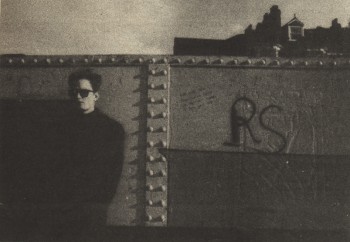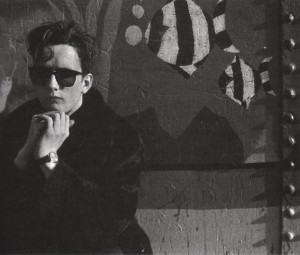
 Pulp
PulpJarvis Cocker, diplomat, playwright, crooner and NH spex wearer, this is yer page...
Pulp is a soft mush of nerves in the interior of your tooth - probe it and you'll wince, feel a slither of fear, or possibly the worst pain imaginable.
I'd say that Pulp from Sheffield sing about love in much the same way. Then again, when they're in contact with the outside world, Pulp are as close to the humorous - the funny bone to you - at that moment when you don't know whether to laugh or cry at your depressing, painful tangle of affairs. "So just lie back and enjoy it and save your tears for when the kissing stops, oh you know it's got to stop" (Don't You Know).
It goes like this. A human climbing frame stuffed inside a third-hand suit behind NH glasses and perplexed eyes, Jarvis Cocker is the voice and core of Pulp. Through eight years and three difficult incarnations, Pulp have had just the one Peel session (scored while still at school in 1981) and the mini-album, 'It', to show for it. Pulp's fondness for theatrical gestures on stage, songs that veer from Radio Two to Radio Five, past the point of Peel programming, and a disposition that can hardly be contained in the expression strange, has meant Pulp are still marooned.
Not that their songs ever scream 'rescue me'. Instead they rub shoulders with the emotionally crippled while trying to touch and bleed the MOR pop classicism of a Jimmy Webb or maybe even a Burt Bacharach.
Later on, the story got even more confused. There will never be a more perfect example of a band's clash of desire and realisation than Pulp's 'Little Girl (With Blue Eyes)' which signalled their return from the wilderness after It in 1985. This was a new Pulp, with Candida, Russell, Manners and Magnus, and the year's most unloved, unrecognised single - an epic, sparse ballad, haunted by piccato violin, swelled by that chorus: "There's a hole in your heart and one between your legs, you never have to wonder which one he's going to fill despite what he says..." Little Girl is a sign of the way Pulp take notions of love, vulnerability and dependency and then expose it. Beautiful ballads are equally ripped and torn by drones, crescendos and thrashes.

"I like aggressive music, say The Birthday Party, but in any type of music, I don't like to stick in into different categories of how I feel."
Fair enough, Jarvis, but Pulp sound more at home on a stage than in a rock gig.
"Probably, but we're in the rock 'n' roll market so we have to play those places. Do you think we're more refined than that?"
Pulp have strands of Sheffield factories and London bedsits, but mostly Parisienne folk clubs, Frankfurt nightclubs; Jacques Brel, Berthold Brecht...
"I can see that, but I don't like this idea of this 'singer-songwriter' idea. I don't mind having been compared to Webb and Bacharach, but the more wimpy types like Donovan..."
Jarvis looks hurt.
"We can do it the other way, which is like to sledgehammer it into people."
Those people probably have enough problems of their own. All those doomed relationships, all that self-torturing. Pulp can't help but satirise the fatalism, but are they entertainers, spectators or commentators as they interfere with our daydreams?
"I've wondered about this sometimes because I don't want to appear as if I'm looking at the world and moralising and pontificating. I would just hope that we don't contribute to the problem. Most of the music that I listen to is a true reflection of the world because it's crap. Hopefully Pulp can make music as a sound track to the world as I'd like it to be, as perhaps it could be."
Both the last two singles, 'Dogs Are Everywhere' and 'They Suffocate At Night', two bulging ballads, failed to sell. It's going to be hard for Pulp. The new album, Freaks, walks by a fairground, gets followed home, jumps in and out of bed and tries to repair the irrepairable. People hate each other. People love each other. People are their own worst enemies. Guitars are strummed for sadness and violated for desperation. Imagine a Roman Polanski soundtrack to a Phil Spector movie. Collapsing new feelings.
"Sometimes truth is very ugly but if it is true, then it can't help but be beautiful. It's certain realisation. You either get depressed about them or you see a funny side to it. Just to realise what things are." "As the signs outside proclaimed, nature sometimes makes mistakes"
One last question; Jarvis, you said 'It' was "very innocent and naive, trusting love and romance. I suppose I'm a bit more realistic now." But have you been in love since?
"I don't really like to use that word anymore. I don't know what it's supposed to mean."
